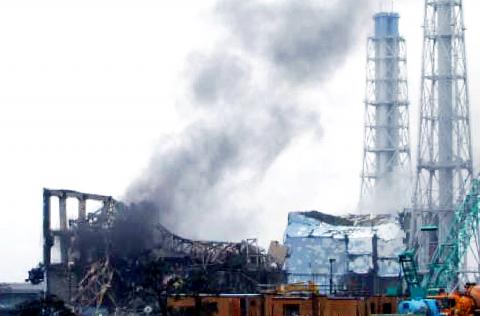The Japanese government may inject between US$13 billion and US$19 billion into Tokyo Electric Power Co (TEPCO) in a de facto nationalization of the operator of the crippled Fukushima Dai-ichi nuclear power plant, domestic media reported yesterday.
TEPCO’s future as an independent firm has been in doubt since a quake and tsunami wrecked the plant in March, triggering the world’s worst nuclear crisis in 25 years and leaving the firm with huge compensation payments and clean-up costs.
The full scale of any TEPCO bailout remains unclear, with media carrying differing accounts of what is being considered.

Photo: AFP/HO/TEPCO VIA JIJI PRESS
Kyodo news agency yesterday said the total bailout could reach US$39 billion, with half coming from private borrowings, while the Mainichi Shimbun said the government planned to inject at least US$13 billion and perhaps as much as US$27 billion, but did not mention other fund raising.
The Mainichi said TEPCO was increasingly likely to see its liabilities exceed its assets in the next financial year, ending in March 2013, and that a government-run bailout fund would buy preferred shares to be issued by the utility.
Shares in TEPCO slid as much as 17 percent before regaining some ground to trade down 11 percent at ¥244.
“TEPCO shares fell on fears that this could lead to [share] dilution, although this could also reduce the risk of bankruptcy,” said Hiroaki Kuramochi, general -manager at Mita Securities.
TEPCO would have to get shareholder approval to increase the ceiling on the number of shares it can issue at its next annual meeting in June.
To cover costs, Asia’s biggest utility is pushing for hikes in electricity charges and for permission to restart nuclear reactors, particularly its biggest one, Kashiwazaki-Kariwa.
Pushing TEPCO to accept capital would also allow the government to pursue drastic reform of its energy policy, including the separation of power generation and power distribution, it said.
The Mainichi added that a government panel led by Japanese Chief Cabinet Secretary Osamu Fujimura could in the new year announce plans for an injection of public funds, though Fujimura told reporters yesterday that the issue of public funds was currently not on the table.
“The government hasn’t been debating this matter recently and at this point we are not scheduled to do so in the future,” he said.

UNCERTAINTY: Innolux activated a stringent supply chain management mechanism, as it did during the COVID-19 pandemic, to ensure optimal inventory levels for customers Flat-panel display makers AUO Corp (友達) and Innolux Corp (群創) yesterday said that about 12 to 20 percent of their display business is at risk of potential US tariffs and that they would relocate production or shipment destinations to mitigate the levies’ effects. US tariffs would have a direct impact of US$200 million on AUO’s revenue, company chairman Paul Peng (彭雙浪) told reporters on the sidelines of the Touch Taiwan trade show in Taipei yesterday. That would make up about 12 percent of the company’s overall revenue. To cope with the tariff uncertainty, AUO plans to allocate its production to manufacturing facilities in

TAKING STOCK: A Taiwanese cookware firm in Vietnam urged customers to assess inventory or place orders early so shipments can reach the US while tariffs are paused Taiwanese businesses in Vietnam are exploring alternatives after the White House imposed a 46 percent import duty on Vietnamese goods, following US President Donald Trump’s announcement of “reciprocal” tariffs on the US’ trading partners. Lo Shih-liang (羅世良), chairman of Brico Industry Co (裕茂工業), a Taiwanese company that manufactures cast iron cookware and stove components in Vietnam, said that more than 40 percent of his business was tied to the US market, describing the constant US policy shifts as an emotional roller coaster. “I work during the day and stay up all night watching the news. I’ve been following US news until 3am

COLLABORATION: Given Taiwan’s key position in global supply chains, the US firm is discussing strategies with local partners and clients to deal with global uncertainties Advanced Micro Devices Inc (AMD) yesterday said it is meeting with local ecosystem partners, including Taiwan Semiconductor Manufacturing Co (TSMC, 台積電), to discuss strategies, including long-term manufacturing, to navigate uncertainties such as US tariffs, as Taiwan occupies an important position in global supply chains. AMD chief executive officer Lisa Su (蘇姿丰) told reporters that Taiwan is an important part of the chip designer’s ecosystem and she is discussing with partners and customers in Taiwan to forge strong collaborations on different areas during this critical period. AMD has just become the first artificial-intelligence (AI) server chip customer of TSMC to utilize its advanced

Six years ago, LVMH’s billionaire CEO Bernard Arnault and US President Donald Trump cut the blue ribbon on a factory in rural Texas that would make designer handbags for Louis Vuitton, one of the world’s best-known luxury brands. However, since the high-profile opening, the factory has faced a host of problems limiting production, 11 former Louis Vuitton employees said. The site has consistently ranked among the worst-performing for Louis Vuitton globally, “significantly” underperforming other facilities, said three former Louis Vuitton workers and a senior industry source, who cited internal rankings shared with staff. The plant’s problems — which have not